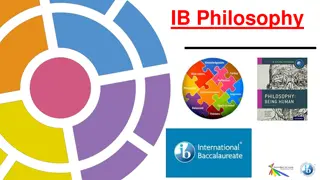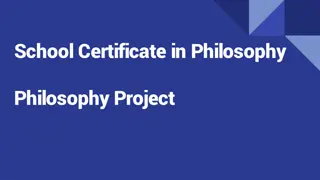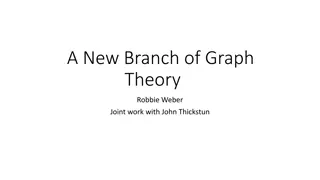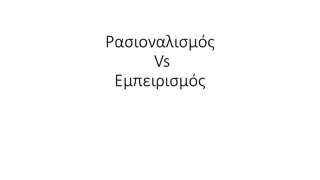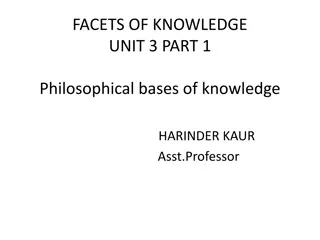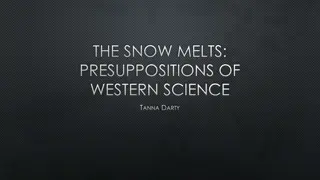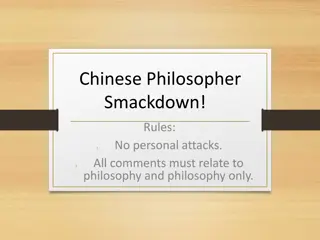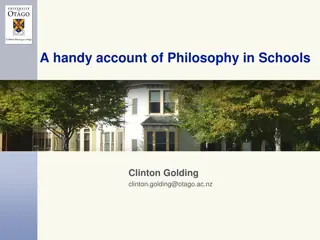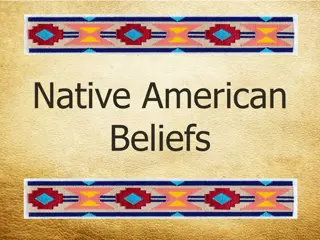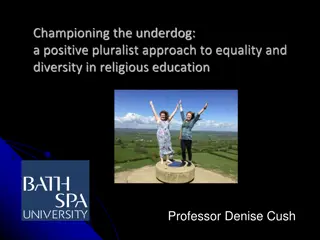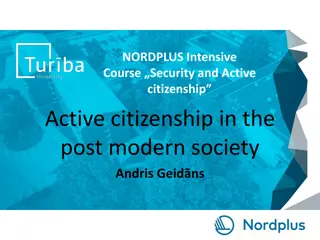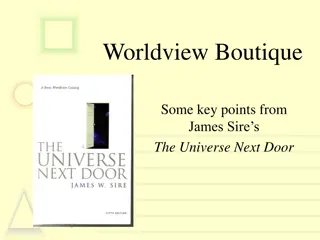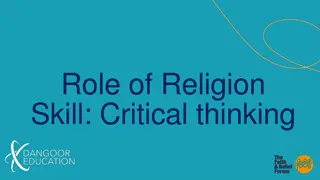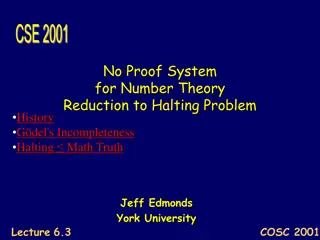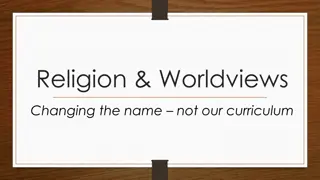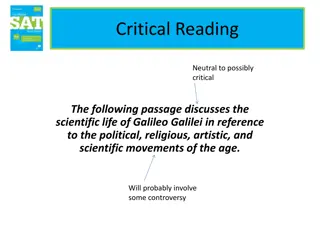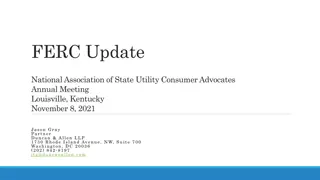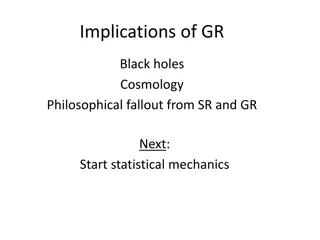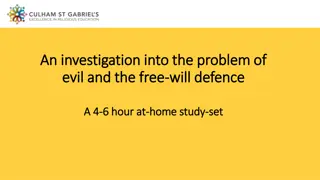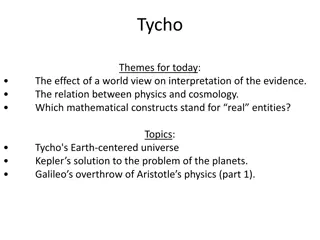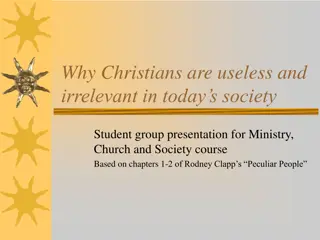Exploring Worldviews: A Philosophical Journey
Delve into the realm of worldviews and philosophy with insights on what shapes our perception of reality, beliefs, and values. Understand the core components of worldviews, from ground-floor assumptions to worldview fracturing, in this thought-provoking exploration.
Download Presentation

Please find below an Image/Link to download the presentation.
The content on the website is provided AS IS for your information and personal use only. It may not be sold, licensed, or shared on other websites without obtaining consent from the author. Download presentation by click this link. If you encounter any issues during the download, it is possible that the publisher has removed the file from their server.
E N D
Presentation Transcript
Starting Place for Philosophy: Your Worldview: www.prshockley.org
Welcome to worldview thinking Lecture 1: What is a worldview? www.prshockley.org
Where should we begin into philosophy. Let s begin with your worldview Everyone possesses a worldview This includes You!
What is a worldview? Paul R. Shockley & Raul F. Prezas write: A worldview is one s habituated way of seeing and doing; the way one observes and interacts with the world, the sum-total of one s beliefs, ground floor assumptions, or conceptional conscious and unconscious themes by which one perceives all things (p. 30).
Ground-floor assumptions include: Our view of God Our view of Reality Our view of truth Our view of knowledge Our view of humanity Our view of ethics Our view of evil Our view of beauty
Worldviews are formed contextually: Intra-generationally: organizations, clubs, or special interest groups that communicate certain ideas, beliefs, activities, and rituals. Inter-generationally: Passed down from one generation to another (e.g., parents; father/mother figures) Informally Uncritically Community: shared beliefs, biases, values, and daily, sacred and non-sacred rituals, and other activities. Over time Habits: We experience the good, the bad, and ugly. we form habit-beliefs
The clarity of our worldview is shaped by the following: 1. Presuppositions: fixed biases that do not change unless they are placed under extreme duress. 2. Pre-commitments: a commitment to some belief (s) that limits alternative ideas, choices, and possibilities. 3. Pre-understandings: moldable influences that come and go. 4. Faculties of the mind. Is your mind working properly?
Worldview Fracturing: In Thinking with Excellence, Shockley & Prezas write: When one experiences cognitive and existential tension (dissonance) to the existent that one s worldview fractures, falls apart, or is exchanged for another worldview (a better or worse one), one experiences worldview fracturing (p. 34).
Later in Thinking with Excellence, they observe: Worldviews may possess varied degrees of tension or cognitive and existential dissonance. Thus, the goal, like physical therapy, is to relieve the tension by facts, logical consistency, and evidences that address the whole person. This relief will work when your worldview harmonizes those facts, logic, and evidences together and is brought to bear in the way you actually live your life, the daily choices you make, the values you embrace, and even the pleasures you pursue. (p. 35).
Ritual Purification as a Source for Worldview Fracturing: Berger and Luckmann sThe Social Construction of Reality: Ritual Purification s use of ritual purification: In their article, A Stranger in One s Own Community: Iterations of Ritual Desecration and Reverse Ritual Purification (which will be published Fall 2023 in the annual publication of Schutzian Research: A Yearbook of Worldly Phenomenology and Qualitative Social Science, Raul F. Prezas & Paul R. Shockley write: In their book, Berger and Luckmann (1967) discuss the phenomenon of ritual purificationor a mental hygiene reality-maintenance whereby 'maintaining procedures may be established to cope with foreigners and their potential threat to the official reality. The individual may have to undergo an elaborate ritual purificationafter contact with a foreigner (Berger & Luckmann 1967: 156). Rituals are structured patterns managed by a particular shared set of duties, expectations, symbols, and values. Rituals not only represent a normalized way of acting, interacting, reflecting, and sustaining a sense of order and understanding, but also reaffirm personal and social belonging, identity, and purpose. Since rituals are established series of actions dynamically and symbiotically cognitive and affective, habituated in thought, feelings, desires, and actions, and can even be ceremonial and sacred in society, they are performed to a prescribed order. Thus, when people engage in ritual purification, they externally and internally reinforce their homogeneous understanding of reality, generating, and sustaining cognitive, existential, and social stability.
Ritual Desecration: In the same article, A Stranger in One s Own Community: Iterations of Ritual Desecration and Reverse Ritual Purification Prezas & Shockley define and describe ritual desecration. Ritual desecration is defined as a continuum of self-deprecation that one experiences due to others' judgment, discrimination, prejudice, hatred, oppression, marginalization, and violence. Ritual desecration can be short-term or long-term and ranges from mild, moderate, severe, or profound. Consider these three examples.
Mild Form of Ritual Desecration: A mild form of ritual desecration would be beauty advertisements that entice people to change their appearance (e.g., Clairol s classic slogan Blondes have more fun). In this case, the advertisements lead to changes in appearance that may engender a dislike of one s natural appearance.
Severe Form of Ritual Desecration: The most severe or profound form of ritual desecration would be when someone is unhappy with themselves due to long-term ongoing bullying and violence (severe) that they choose to self-harm or commit suicide (profound). Social rejection and exclusion are not so dissimilar from physical injury, pain, and trauma and can impact emotion, cognition, and even physical health (Weir 2012: 50). It is estimated that at least one LGBTQ youth between the ages of 13-24 attempts suicide every 45 seconds in the U.S (The Trevor Project 2021: n.p.).
Moderate Form of Ritual Desecration: A moderate form of ritual desecration might be colleagues who offer unsolicited questions, suggestions, or remedies to the problem of singleness to one who is asexual. An asexual is not identified, defined, or driven by sexuality. Associates perceive contentment in singleness as a hindrance. Others are suspicious, searching for indicators that betray one s claim of asexuality and contentment in singlehood. Consequently, the asexual individual leaves the conversation painfully misunderstood and pressured to conform to social expectations. Even if well-intended and perhaps unaware of what they are doing, conforming to sexuality by peer pressure can be very coercive."
Our View of G-d: An underlying presupposition that governs actions and behavior: Atheism: there is no G-d. Agnosticism: Hard agnosticism: one cannot know whether G-d exists. Soft agnosticism: one does not yet have enough information to know whether G-d exists. Pantheism: G-d is the universe. Panentheism: G-d is in the universe.
Our View of G-d: An underlying presupposition that governs actions and behavior: Finite godism: A finite G-d exists beyond and in the universe. Deism: G-d is beyond the universe but not in it. Polytheism: there are many gods both beyond and in the world. Monotheism: An infinite personal G-d exists both beyond and in the world Dualism: Belief in two supreme oppositional (light/darkness) beings, powers, or principles:
Our view of reality: An underlying presupposition that governs actions and behavior: Reality (Metaphysics): The question of the ultimate nature of reality Is reality both physical and spiritual? Only material? Only spiritual? What lies beyond physical aspects of nature? How do (did) things come into being? What does it mean for something to be? Is there a realm of being which is not subject to change?
What is real? Materialistic Reality (reality is nothing but matter; there is no such thing as something being spiritual or immaterial; there is no G-d, no devil, no miracle); Illusionary Reality (world is an illusion; e.g., Matrix program; evil is not real; cosmic game).
What is real? Materialistic/Spiritual Reality (e.g., God created this real world where miracles, divine intervention, and spiritual warfare occur, and where God s divine providence is expressed as He directs history, people, and nations in His plan for the ages. Extensional (Cultural) Reality reality is in the eye of the beholder, an extension of one s personality!
What is real? What is the relationship between G-d and the universe? Is the existence of the universe a real fact? Is the universe eternal? Is the world best understood in a mechanistic, non-purposeful way? Is there a purpose in the universe? Can G-d act causally within nature? Are miracles possible?
Our view of truth: Everyone has a concept of what is true/false. This underlying presupposition governs behavior, decision-making, and actions: Consider What is truth? Can we even define truth Can we know truth? Can we know truth with certainty? Is truth merely opinion controlled by the dominant forces of our society? How is it that so many people have so many different views of truth? Is truth relative? How can we say something is false if we have not conception of what is true.
Our view of truth: Everyone has a concept of what is true/false. This underlying presupposition governs behavior, decision-making, and actions: Pragmatism: truth is that which works. If something works, then it must be true. Coherence: internal harmony of ideas. If something does not harmonize with the ideas that already cohere, it may not be true. Correspondence: truth corresponds to reality, identifies things as they actually are.
Our view of truth: Everyone has a concept of what is true/false. This underlying presupposition governs behavior, decision-making, and actions: Poststructuralism is an intellectual movement in various fields of continental philosophy that whole heartily rejects binary oppositions such as truth/false; right/wrong; good/evil and formulates views following that rejection. They argue that these concepts are rooted not in reality but in modernistic philosophy that has scripted Western thought and culture.
Our view of truth: Everyone has a concept of what is true/false. This underlying presupposition governs behavior, decision-making, and actions: Postmodernism rejects the belief in universal absolute truth that transcends culture, time, and space by redefining it to say that truth is that which is created, defined, and articulated by local (sub) communities. Interestingly, present statistics show that young people today are choosing a postmodern worldview over and against all other worldviews.
Our view of knowledge: 1. Reason alone to the exclusion of faith 2. Faith alone to the exclusion of reason 3. Faith + Reason (God created people to think rationally) 4. Intuition 5. Empiricism 6. Rationalism 7. Mysticism 8. AI
Our view of knowledge: Consider these questions asked by thinking people: Can we trust our senses? What are the proper roles of reason and sense experience in knowledge? Are our intuitions more dependable than our perceptions? What is the relationship between faith and reason? Is knowledge about God possible? If so, how? Should we appeal to mystical downloads for spiritual knowledge?
Our view of Humanity: Strictly Materialistic (i.e., all life is biomechanical machinery; there is no soul, no spirit, no immaterial aspect within humanity). Material/Spiritual (humanity includes both material and immaterial elements). 1. 2. Life is intrinsically valuable. Quality of life vs. inherent dignity of life.
Our view of Ethics: Virtue Ethics: An action is right if and only if it is what the virtuous person would do. Deontological Ethics: An action is right if and only if it is in accord with a moral principle or command. Consequential Ethics: An action is right if and only if it promotes the best consequences.
Our view of Ethics: Situational Ethics: majority or elite determines what is right or wrong. Situational Contract Ethics: two parties agree what is right from wrong. Reflective Equilibrium: we use our intuitions to formulate principles to live by and formulate principles from our situational setting. Then, these two levels engage each other (i.e., reflect or feedback) to sharpen, refine, or even change our justifications for moral choices as time and culture changes and more information is added.
Our view of Evil: 1. Inherent evilwith the tendency to sin. 2. Evil is simply making a wrong choice (we are innately neutral or good, not evil). 3. Evil is illusionary. Consider these questions: a. Why do good people do bad things? b. What is evil? c. What is good? d. Why do good people suffer? e. What is good vs. evil?
View of Beauty Is beauty relative to a particular person or culture? Is beauty objective (e.g., symmetry; balance; certain arrangements of lines, color, space, and technique)?
Questions to Help Us Know More About One s Worldview: a. b. c. What are we? Where do we come from? What has gone wrong with the world? What can we do to fix it? [redemption]. Consistently ask these three questions: Or we can ask these questions: a. What is real? b. What are the nature and limits of knowledge? c. Who is well-off? What is the good life? d. Who is a really good person? e. How does one become a really good person? 1. What do you mean by that ? 2. How did you come to that conclusion? 3. What are your reasons for saying that?
The Problem of Arbitrary, Social Conjecture: In Thinking with Excellence, Shockley & Prezas note: As you analyze other people s worldviews, you will quickly observe common, random statements of conjecture in communications and conversations, conferences and conventions, the arts and the sciences. Often tainted by prejudice (e.g., anti-intellectual; philosophical; racial; religious; social), conjectures are assumptions made without proof. Their statements and proclamations are not researched, properly reasoned, or evidentially supported. When connected with other biases inferences, they reveal logical inconsistences.
The Problem of Arbitrary, Social Conjecture: In Thinking with Excellence, Shockley & Prezas note: Arbitrary, unsupported, and logically inconsistent truth-claims can become roadblocks to honest inquiry, rational discourse, the practice of civility, and even a better future To help sort out what is conjecture and what is not, ask this question: What s your basis for saying that? If one can t defend the truth-claim one is making, then it is likely conjecture (pp. 53- 54).
















